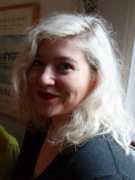Flash Point
My best friend is buying a house in Upstate New York with her boyfriend. A family friend expects her first child in eight days. I’m twenty-two, and I have never felt more alone.
I. “For this was the round of love: fear which leads on desire, tenderness and fury, and that brutal anguish which triumphantly follows pleasure,” Françoise Sagan, seventeen-years-old, wrote in Bonjour Tristesse.
At thirteen, I lie awake at night, wrapping my arms about my own torso, and imagine they belong to someone else. I dream of unrequited love; the most poignant stories are always bittersweet. The Brontës are my bonnes soeurs.
Five years pass. Unpacking boxes into an empty dorm, I hesitate. What could love do to me? Friends give up opportunities in the name of compromise, for “love.” Chipper, they readily change the shape of their lives to suit someone else’s plans. My decisions are my own now. I choose solipsism.
II. “I don’t know how to write love letters,” Frieda Kahlo wrote in 1946. “But I wanted to tell you that my whole being opened up for you. Since I fell in love with you, everything is transformed and full of beauty… love is like an aroma, like a current, like rain.”
I have a friend who is an actor in New York. Caught between time zones, we attempt to keep each other relevant in our increasingly separate lives.
I tell him that I love him. I try to distill my feelings into a straightforward narrative. I tell him that there are obstacles.
On my morning métro commute, I lean heavily against the window, watching the tangle of Gare du Nord slide by. My phone flashes with the flow of his uninhibited late night musings. At twilight, walking home from work, he reads my snarled texts about the trials of putting down roots in a transient city. We compare the pressures of trying to make it in cultural capitals: our shaken sense of place, identity; our occupational dreams and whether or not we’re cut out for them. But we always come back to love.
“This is the most mixed up, terrifying, exciting time of my life, and this love thing? Those feelings are the most mixed up of all,” he writes to me.
I tell him I have met a man. I tell him that I love him. I try to distill my feelings into a straightforward narrative. I tell him that there are obstacles.
III. “I saw her again last night, and you know that I shouldn’t,” John Phillips wrote for The Mamas and The Papas’ self-titled, second album.
People ask me if I have someone. Turning twenty-five demands it: invitations to weddings clutter my letterbox; engagement announcements stack up in my feed. They mistake my hesitation. I’m searching for words. Do I begin with a lecture on their assumption that a relationship defines me, or attempt to explain the unformed thing we have between us?
What little I know about firefighting is at the forefront of my mind: the time during a fire at which the room is so completely consumed with flames that saving it becomes an impossibility—the flash point. It is the point of no return; a moment splitting your life into a before and an after.
I lose myself in your orbit. I go soft. At once open and closed, I wonder if you notice that you’re missing half of me.
A close friend watches me with you. I lose myself in your orbit. I go soft. At once open and closed, I wonder if you notice that you’re missing half of me. Does loving you demand division? You’re incapable of telling yourself how you feel, but your whole face lights up at the sight of me. I resign myself to this.
IV. “And I can’t be running back and forth forever between grief and high delight,” J. D. Salinger writes at the closing of Franny and Zooey.
In attic rooms, we argue. His bag clinks as he sets it down. He never arrives without three bottles of red wine.
“You’re a child,” he spits, refilling his glass again. He leans back in his chair and tells me exactly what’s wrong with me. I choke down a fourth glass, hoping it will allow me to be myself.
I wake to one-line apologies.
When we first fell, we’d linger in his bed, push our heads close together. Glasses on the nightstand, his face was the only thing in focus as the sun changed its slant across the white plaster walls.
Abruptly, he is gone.
These days are no longer shaped by his fluctuations. Feeling the unspoken edges, my heart heals slowly. For the first time in months, my rhythm is my own. I wonder how he fills his hours. I wonder who calms him down. He still has my book, and I wonder if he thinks of me.





